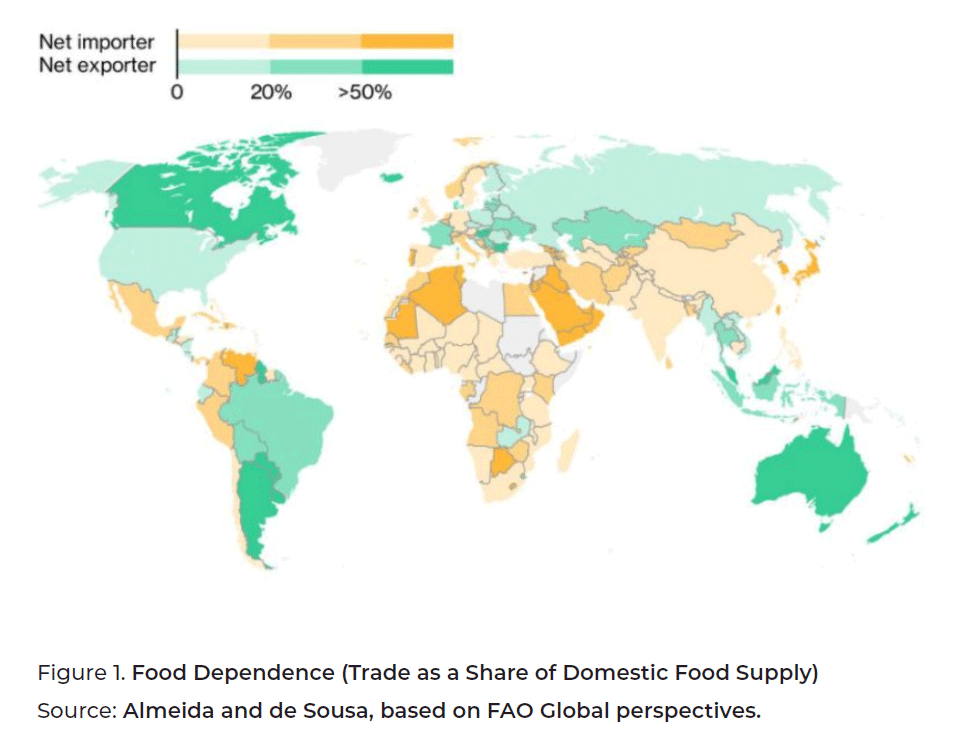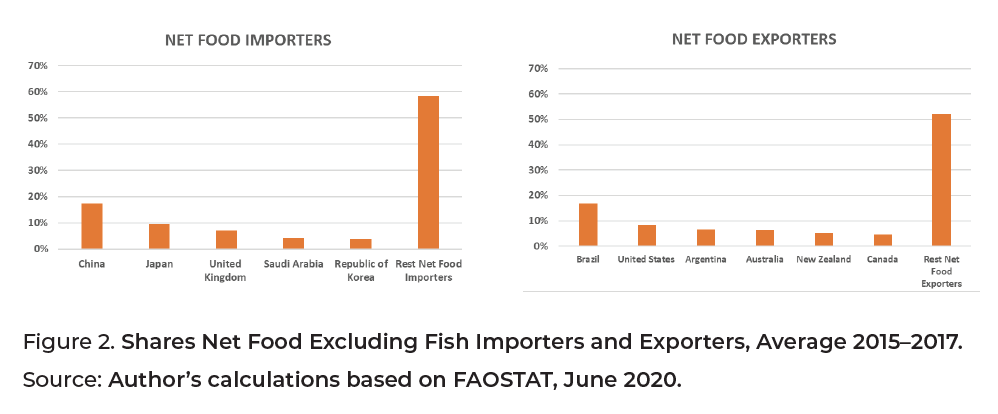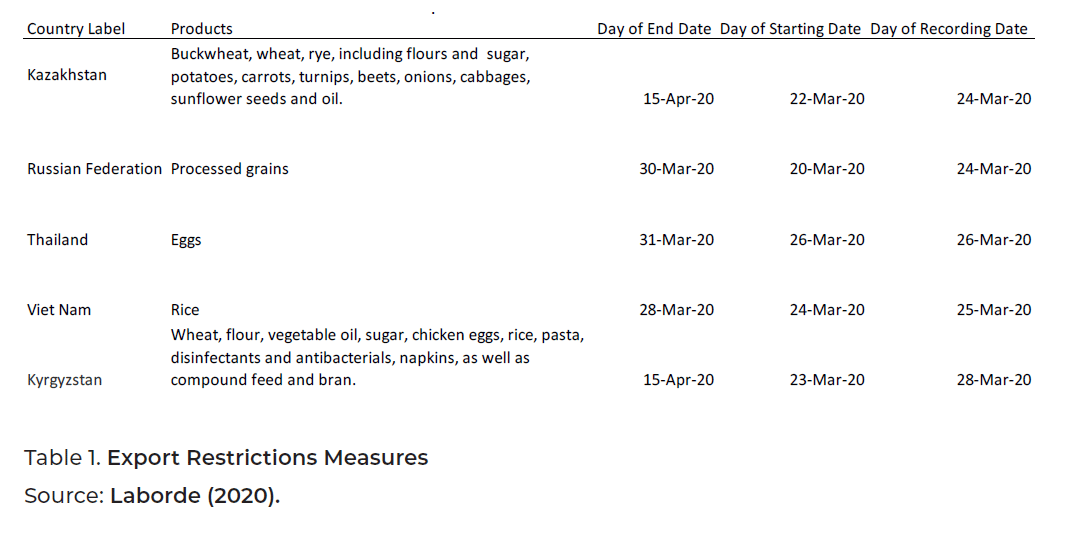The challenge to produce more food to meet the growing world demand requires a careful, integrated, and global approach to secure the efficient and sustainable use of land, water, and energy aimed at increasing productivity and food supply. Currently, in many regions, crop production is still developed under intensive production systems that deteriorate natural resources and contribute to climate change. More environmentally friendly production systems are needed, which requires improvements in the measurement of sustainable practices in crop production and monitoring of production systems in different regions. This will provide international comparisons and help track performance over time.
Additionally, regional production and consumption imbalances are associated with regional differences in resource endowments. Therefore, trade is, and will be in the future, crucial for the global production system’s ability to provide sufficient food to meet food security sustainably. However, the global trade of agricultural products continues to be seriously limited by trade policies and could be worsened by new measures implemented by some countries during or after the COVID-19 crisis. Therefore, the G20 should promote policies and measures to facilitate dialogue and information exchange on supply and demand. This can foster agreements among food trading partners based on a more open trading system that can reconcile both objectives: global food security and environmental sustainability.
Challenge
The world population is expected to reach 8,500 million people by 2030, about 800 million more than in 2019 (UN 2019). Simultaneously, there are growing social and political concerns regarding the increasing economic scarcity of natural resources, their management, and the impacts of climate change.
These concerns have led the international community to propose specific mechanisms to improve global governance on environmental issues. The most ambitious mechanism was created within the United Nations Framework Convention on Climate Change (UNFCCC). However, mechanisms are also encouraging the implementation of specific policies at the national or regional level (such as the EU Green Deal), which has created new challenges for food production.
The challenge to produce more food using available natural resources efficiently and sustainably requires a careful and integrated approach to secure the efficient use of land, water, and energy at the global level by increasing productivity from global production systems sustainably.
Given that regional production and consumption imbalances are, and will be, relevant, trade is crucial for coping with such challenges. Differences in resource endowments, such as the amount of potential land available for agriculture and the availability of renewable water that could be devoted to food production, are also highly relevant in different regions (see Appendix). Many countries are facing serious limitations on land area and renewable water availabilities to sustain their needs for food production growth.
Therefore, a smooth global food trading system should also be a major objective aimed at facilitating food security and moving to production systems that use conservation practices. Simultaneously, such a system must address water scarcity through the virtual water trade (Gulati, Kharas, and von Braun 2017), as water embedded or incorporated into traded products and land degradation.
During critical times, such as the current COVID-19 crisis, the need to guarantee access to food and assess the logistical strength of food trading systems as a whole becomes evident. Even if the global food supply is sufficient to meet the global demand, if the food is not able to reach all consumers, food insecurity can occur at a local or national level. Therefore, understanding the location of trade junctures is key for better decision-making.
However, the global trade of agricultural products continues to be limited by trade policies implemented by most countries. During the COVID-19 crisis, some countries have rapidly taken measures that affect international trade flows and the availability of food and generate greater price variability (Harvey 2020). These obstacles are inconsistent with global food security purposes, and with the need to tackle natural resources deterioration and climate change.
Despite their increasing importance, environmental issues, sustainable food systems, and global food security have not been considered seriously in international trade negotiations in the World Trade Organization (WTO) during the last few decades. Therefore, world leaders should identify to what extent trade barriers that are not based on science are affecting food security, climate change, and water availabilities. In the current context, the Group of Twenty (G20) could play an important role in promoting future global food security and environmental sustainability based on a more open trading system.
Proposal
Proposal 1. Improvements in the Measurement of Sustainable Practices in Crop Production
Increasing productivity and total food availability must be achieved while considering the impact of the production systems on climate change and natural resources sustainability. These purposes require a careful and integrated approach for the efficient use of land, water, and energy, aimed at increasing productivity and the global food supply with sustainable production systems.
Currently, most world crop production is still developed under production systems that are not environmentally sustainable. Some of these production systems have increased productivity through fertilizer and fossil fuel user, contributing to climate change and soil erosion as well as decreasing water quality. Therefore, in many regions, there is still room to produce food more sustainably. This could lead to less intensive production systems in some regions that should be balanced with increases in supplies in other regions endowed with abundant natural resources and better climate conditions. A smooth global trading system is crucial for global food security.
By contrast, in other regions endowed with abundant natural resources, technological innovations and production processes are being implemented that have increased competitiveness and productivity with environmentally friendly production systems. This sustainable intensification strategy for agriculture is based on the convergence of various innovations such as no-till strategies, crop rotation, cover crops, sanitation, precision farming, and improved seeds that include genes for herbicide, insect, and disease resistance (implying lesser use of agrochemicals). Other important innovations include new chemical molecules in agrochemicals, integrated plague control, intensive use of information and communication technology, satellite-image support, logistic innovations that include silo bags, post-harvest management, and precision nutrition.
For example, the no-till strategy integrates a production system that reduces soil erosion and improves rainwater storage in the soil (strategic water management). This is a production system designed at maximizing productivity sustainably by improving the use of natural resources, minimizing the number of tilling operations, and reducing oil consumption and greenhouse gas (GHG) emissions. Despite its advantage, less than 10% of total world crop production is under the “no-till management strategy” (Regúnaga et al. 2017).
There are positive results of the sustainable intensification strategy in some countries that provide interesting results for the challenge of producing more food while improving soil conditions, using water more efficiently, and mitigating GHG emissions. Some of these technologies and strategies could be adopted globally. Eventually, if these strategies lead to lower rates of productivity growth in some regions with limited availability of water and land, these deficiencies could be balanced with increased supplies from other regions better endowed and facilitated with a smooth world trading system.
To make progress in this strategy, it is necessary to systematize a large amount of information available and propose a global strategy that increases the total availability of food, mitigates the impact on the environment, and improves the quality and availability of resources. Subsequently, four concrete actions are proposed:
- Improvements in the measurement of sustainable practices in crop production— such as no-till and cover crop practices—should particularly focus on productivity, soil recovery, and water resources availability in relation to cultivated land and overall arable land availability.
- The G20 should instruct the Meetings of Agricultural Chief Scientists of G20 States to coordinate a white paper on the measurement of sustainable practices in crop production in different regions. They should consider productivity, soil recovery, and the efficient use of water resources to promote a research agenda on these issues.
- The G20 should give a mandate to international organizations (FAO, OECD, IFPRI, IICA, CGIAR, and UNCTAD) to monitor sustainable practices systematically and jointly and provide international comparisons and track performance over time.
- The G20 should lead in the WTO and the United Nations (in the framework of the UN Water Convention) in addressing the link between international trade and sustainable water use, incorporating virtual water into the discussion. This approximation should reflect the availability and supply source of water (green, blue, or gray).
Proposal 2. Policies to Facilitate Dialogue, Information Exchange, and Foster Trade Agreements Between Food Trading Partners
Globally balanced, sustainable production systems and a smooth food trading system are the two main elements of complying with environmentally sustainable food security. However, we have seen during the last few years that the trading environment has deteriorated, especially in relation to the food sector. The trade tensions between the US and China introduced volatility, uncertainty, and trade diversion in certain food commodities. For example, the price and quantities of soybeans exported by Brazil to China were significantly affected by import tariffs imposed by China on US imports (Gale, Valdes, and Ash 2019). Additionally, several countries have recently adopted more protectionist attitudes, in some cases accompanied by specific trade policies. These situations could become a negative element for trade and, consequently, for food security in net importing countries that depend on trade to ensure food supplies for their population (Figure 1).

Countries that are especially sensitive to the instability of food markets are large net importers or big exporters that are dependent on agricultural exports (UNCTAD 2019). The main countries that correspond to these characteristics are evident in Figure 2.

The G20 should act in a concerted manner to contribute to the necessary sustainability of the global governance system in relation to international trade. Of particular importance is the reform of the WTO to incorporate new ways of working that consider the new realities of global trade. In particular, the full incorporation of a regime under which plurilateral agreements are made among a limited number of countries is open to others that may wish to join after its conclusion.
In this context, it is proposed that the G20 promotes and facilitates the organization, within the WTO, of a special group of countries with high interest in agricultural trade and environmental sustainability. This group should encourage dialogue and discuss proposals and progress in special trading agreements to facilitate agri-food trade, while promoting environmentally sustainable practices (Piñeiro et al. 2017).
Within the G20, the Agricultural Market Information System (AMIS), created in 2011 in response to the 2008–2012 international food crisis, can lead to the creation of a special group of countries and generate a space for dialog and in the gathering of relevant information. In 2010, the Seoul Summit of the G20 gave a mandate to different international organizations that created the base background for setting up AMIS. A comprehensive set of proposals to deal with price volatility and food security was presented, where measures to increase long-term productivity, sustainability, and resilience of agriculture were included to improve food security (AMIS 2011a). The G20 governments committed to take comprehensive action to strengthen the longer-term productivity, sustainability, and resilience of the food and agriculture systems. The AMIS mandate was initially set to improve agricultural market information, report on abnormal international market conditions (including structural weaknesses), collect and analyze policy information, promote dialog and international policy coordination, and build data collection capacity in participating countries (AMIS 2011b). In this sense, after almost a decade of existence, AMIS is a well-established group that has been able to build strong relationships between different international organizations and members. The sustainability agenda could be added to the meetings and activities that the platform already has in place, and with the help of GEOGLAM (G20 activity that monitors crop conditions), production areas and sustainability practice measurements can be explored. Additionally, AMIS can analyze the trade junctures and promote research and dialogue related to the food system bottlenecks that are a threat to food security at local and national levels. To add this initiative to the AMIS mandate, the G20 should provide AMIS with financial support to fulfill this task.
This initiative is important in the context of COVID-19, its negative consequences associated to eventual additional restrictions to trade, and the potential impact of these restrictions on food security in net importing countries and on macroeconomic stability in food-exporting countries.
Table 1 illustrates that in late March 2020, some countries had implemented export restrictions in commodities, such as wheat and rice and other food products. The AMIS is a well-established G20 initiative utilized during previous international food crises. Monitoring global and regional markets and providing analysis through AMIS could be fundamental to prevent a future crisis.

The two main proposals in this policy brief justify all possible efforts to sustain and strengthen global governance systems that contribute to a vibrant multilateral trading system. Such a system serves all countries and makes possible a viable and prosperous world. The complexity of the challenge highlights the importance of the proposed improvements in the understanding and measurement of sustainable production systems. Furthermore, a systemic approach based on constructive dialogue among net food importing and exporting countries using reliable information exchange on global and regional food supply and demand is necessary for global food security.
Disclaimer
This policy brief was developed and written by the authors and has undergone a peer review process. The views and opinions expressed in this policy brief are those of the authors and do not necessarily reflect the official policy or position of the authors’ organizations or the T20 Secretariat.
References
Agricultural Market Information System (AMIS). 2011a. “Enhancing Market Transparency.”
Accessed March 24, 2020. http://www.amis-outlook.org/fileadmin/user_upload/amis/docs/reports/Improving_global_governance_for_food_security.pdf.
Agricultural Market Information System (AMIS). 2011b. “Agricultural Market Information
System Terms of Reference.” Accessed March 17, 2020. http://www.amis-outlook.org/fileadmin/user_upload/amis/docs/Inception_meeting/AMIS_TERMS_OF_REFERENCE.pdf.
Almeida, Isis and Agnieszka de Sousa. 2020. Countries Starting to Hoard Food, Threatening
Global Trade. Bloomberg. Accessed April 1, 2020. https://www.bloomberg.com/news/articles/2020-03-24/countries-are-starting-to-hoard-food-threatening-globaltrade.
FAOSTATS. 2020. Food and Agriculture Data. Accessed June 3, 2020. http://www.fao.org/faostat/en/#home.
Gale, Fred, Constanza Valdes, and Mark Ash. 2019. “Interdependence of China, USA
and Brazil in Soybean Trade.” ERS-USDA, OCS-19F-01 June 2019.
Gulati, Ashok, Homi Kharas, and Joachim von Braun. 2017. “Key Policy Actions for
Sustainable Land and Water Use to Serve People.” G20 Insights. Accessed March
5, 2020. https://www.g20-insights.org/policy_briefs/key-policy-actions-sustainableland-water-use-serve-people.
Harvey, Fiona. 2020. “Coronavirus Measures Could Cause Global Food Shortage, UN
Warns.” The Guardian, March 26, 2020. https://www.theguardian.com/global-development/2020/mar/26/coronavirus-measures-could-cause-global-food-shortage-unwarns.
Laborde, David. 2020. “Food Export Restrictions during the COVID-19 Crisis.” Accessed
April 27, 2020. https://public.tableau.com/profile/laborde6680#!/vizhome/ExportRestrictionsTracker/FoodExportRestrictionsTracker?publish=yes.
Mekonnen, Mesfin, and Arjen Ysbert Hoekstra. 2011. “National Water Footprint Accounts:
The Green, Blue, and Grey Water Footprint of Production and Consumption.
Volume 2: Appendices.” Value of Water, Research Report Series No. 50. Delft, the
Netherlands: UNESCO-IHE Institute for Water Education.
Mekonnen, Mesfin, and Arjen Ysbert Hoekstra. 2012. “The Water Footprint of Humanity.”
Proceedings of the National Academy of Sciences, 109 (9): 3232–237.
Piñeiro, Valeria, and Martín Piñeiro, eds. 2017. “Agricultural Trade Interests and Challenges
at the WTO Ministerial Conference in Buenos Aires: A Southern Cone Perspective.”
San Jose, Costa Rica: International Food Policy Research Institute (IFPRI),
Inter-American Institute for Cooperation on Agriculture (IICA), et al. http://ebrary.ifpri.org/cdm/ref/collection/p15738coll2/id/131545.
OECD-FAO. 2016. OECD-FAO Agricultural Outlook 2016-2025. OECD Publishing, Paris.
Accessed June 5, 2020. http://dx.doi.org/10.1787/agr_outlook-2016-en.
Regúnaga, Marcelo, Pablo Elverdin, M. Florencia Ricard, and Ernesto F. Viglizzo. 2017.
Food Security, Water Scarcity, the G-20 Agenda, and the Strategic Role of Southern
Cone Countries. Buenos Aires, Argentina: Group of Producing Countries of the
Southern Cone (GPS).
UN. 2019. “World Population Prospect 2019: Highlights.” United Nations, Department
of Social Affairs, Population Division (ST/ESA/SER.A/423).
UNCTAD. 2019. “State of Commodity Dependence 2019.” United Nations Conference
on Trade and Development. Geneva, 2019.
Van der Mensbrugghe, D. 2012. FAO, IADB, and CIAT Seminar.
World Bank. 2012. “High Food Prices. LAC Responses to a New Normal.” WB, LAC
Unit.








